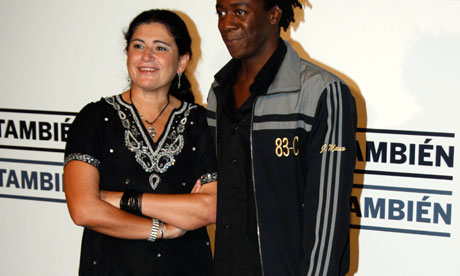
Lucia Etxebarria has every right to feel furious. The Spanish prize-winning author recently learned that her most recent novel has been downloaded illegally so often that it has decimated sales of the hardback. Her previous books have been bestsellers, whereas The Contents of Silence languishes at about 23,500th position on Amazon's Spanish site.
By way of protest, Etxebarria has announced that she will now fall silent. According to a message on Facebook she has given up writing for the foreseeable future. The game, she explains, isn't worth the candle. There's no point in agonising over your prose for three years only to find no cheque at the end of it. Etxebarria says she has been offered a job – which, given the state of the Spanish economy, makes her a winner – and thinks she's going to take it.
It is horrible for a writer to find that her work has been pirated. It feels like a violation. At least I assume it must. For, like the vast majority of authors, I am not in Etxebarria's position of having people so desperate to read my work that they commit a crime to get hold of it. In Spain, says Etxebarria, a slavering free market runs riot.
What I find odd about Etxebarria's position, though, is not her anger so much as her decision to stop writing and take a job. She doesn't specify what kind of job, but I'm willing to bet that it's none of these: night porter, airline pilot, aromatherapist. Far more likely is that she'll take a job teaching others to write, quite possibly in a university. It's what authors tend to do when they're not entirely confident that they will be able to make enough money to support themselves and their families. And given the way that the economics of publishing are going – £10,000 is the new £50,000 when it comes to advances – that means pretty much all of us except, perhaps, Ken Follett.
Let's imagine that Etxebarria is, indeed, going to teach creative writing. What she'll discover on her first day is that the students in her seminar room have very little interest in how much money they are likely to make from their published work. I teach on just such a course at UEA, and I can report that no one tries to write, starts to write, keeps on writing, because they think it would be a handy way to make a living. I've never yet had a student ask about the finances of publishing – how much they might get for a piece of work, as if it were a piece of velvet or a stash of jewels. They don't ask about sales, either. They write – just as published authors write, and will take the most congenial job that allows them to carry on writing – because it is an innate drive, an itch that won't go away.
There's nothing remotely noble about any of this. Authors write not to communicate great truths, but to make their own tiny mark. They want to be heard, and noticed and even sometimes loved. They do it out of a deep narcissism because, quite literally, nothing and nobody else matters. A cheque is nice, but it is never the point.
It is for these reasons that Etxebarria's vow of silence rings hollow. Among the Facebook comments were some vitriolic jabs about the amount of money she has earned in the past from literary prizes, including the Planeta prize, now worth over £500,000. I don't begrudge Etxebarria her luck for a moment, but I am puzzled. Did she honestly go into writing in order to earn money? Is she going to give up now that the financial returns are not what she once enjoyed? If so, Lucia Etxebarria is quite unlike any author or would-be author I have ever encountered before.

